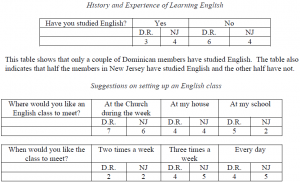Jessica Gibson and Professor Lynn Henrichsen, Linguistics
The Problem: The Church of Jesus Christ of Latter-day Saints is a growing, worldwide church. Thus, the members speak a variety of languages and not just English. Consequently, problems in communication arise such as, contact with church administrators, LDS publications, and unity among church members within a ward. There are differences in these barriers, however, when non-native English speaking members live in the United States compared with when they live in their native country. Immigration, cultural differences, and employment are some possible secular problems that exist for members living inside the United States. Spiritual difficulties happen when they cannot learn or teach gospel principles, communicate with leaders such as the Bishop, and share their testimony with others. As a result, the inability to speak with the wards’ primary language affects all aspects of a member’s life.
ORCA Project: My project consisted of conducting an analysis of the needs and desires of Spanish-speaking LDS members learning English in two distinct areas. These areas were Morristown, New Jersey and Santiago, Dominican Republic. Morristown, New Jersey is an ESL (English as a Second Language) setting because the members are living in the country where the language, English, is being spoken. In contrast, members in the Dominican Republic live in an EFL (English as a Foreign Language) setting because they are learning English, but are not living in an English-speaking country. The ESL and EFL settings create distinct needs for the members in learning English. I gathered data on the needs of members in each setting through surveys.
Analysis Data: The data I gathered from these surveys proved to be very informative. I found differences and similarities in the needs of the members living in the Dominican Republic, the EFL setting and of the members living in New Jersey, the ESL setting. Forty questions were on the survey, but I decided to highlight a few of the more productive ones. These questions were divided into three language themes: How English helps members in every day life, History and experience of learning English, and Suggestions on setting up an English class. These findings for each of these themes will be presented in the form of tables, which show the frequency of each response.
These two tables contain vital information as to how members in ESL settings and EFL settings would like their classes set up. Most of the members in both environments would like to have the English class at the Church during the week. Also, the members have a similar need of learning English at least three times or more. More results and information will be included in a longer paper, which I am writing for presentation at a conference and possible publication.
Benefits to the results: This needs analysis has proven to be very beneficial. My goal has been met because I wanted to report of the comparative needs of people in two settings. This information is helpful for the Linguistic Department because it provides guidance for how to best set up a successful English class. Also, the research informs Church leaders in the Dominican Republic and New Jersey leaders regarding the best way to form an English class in congruence with meeting members’ specific needs. The needs analysis will hopefully lead to greater success because the specific needs are known. In conclusion, this ORCA project has been very rewarding for me personally. Since my major is Spanish Teaching and my minor is TESOL, I have had hands on experiences with Hispanic people and dealing with the importance of learning English. Most importantly, my ORCA project comparing the needs of members living in ESL and EFL environments has been a great opportunity for me to get to know real members of the Church and the real problems they face.


